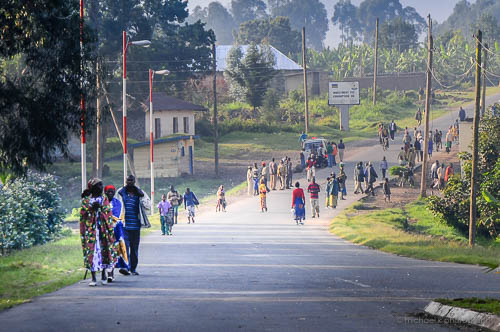Is your giving helping or hurting?
While travelling in Africa last year, we were often in the position of asking the question if we were helping or hurting?

We had just come back from hiking the Virunga mountains in Volcanoes National Park, Rwanda after seeing a family of gorillas, a highly anticipated experience. For my husband and I, the euphoric experience was short lived.
The reality of being in a small town in Africa once again presented itself. A young boy was trying to sell us a picture that he had drawn of the gorillas in the mountains. The struggle continues, to give or not to give?
 During our time in Africa we are confronted on a daily bases with the moral dilemma of giving. Through the struggle we have both become very clear on the parameters in which we will give. However, ‘little boy who worked on art to sell’ hadn’t been an experience we had discerned what are actions would be. This little boy was quite persistent as he ran beside our slow-moving car navigating the potholes for a kilometer, and we believed we now should reward him for his perseverance.
During our time in Africa we are confronted on a daily bases with the moral dilemma of giving. Through the struggle we have both become very clear on the parameters in which we will give. However, ‘little boy who worked on art to sell’ hadn’t been an experience we had discerned what are actions would be. This little boy was quite persistent as he ran beside our slow-moving car navigating the potholes for a kilometer, and we believed we now should reward him for his perseverance.
Helping or hurting, lesson learned
As we asked our Rwandan driver to stop the car, he turned to us and said, “please don’t buy that boys art; if you do, he will continue to sell it and never go to school, and that is the only thing that can save him.” I thanked our driver for the guidance, and we proceeded on without the artwork.

I was disappointed in myself not knowing the consequences of my actions in this particular situation. I had taken such care in evaluating situations and our values of how and when to give without perpetuating continued negative impact.
The Responsibility of Giving
Giving is a responsibility. When confronted with a giving situation if we are not clear on the consequences of that giving we may become frivolous in our generosity.
We take so much time to make our money; however, we don’t take the time to think about the implications of our giving.
As we were on an overland trip through Uganda we were confronted with another situation that again I needed to understand our Guides choices. There were twenty of us eating lunch in a field, and typically when children are near they will sit with us and wait. Increased tension is felt as you have your lunch knowing the children are just anticipating the leftovers and I sit and wonder if they will receive them.
As we packed up, it became clear that although there were leftovers, we were not going to give them to the children. Surprised by our decision, I was the only one who asked our guide why she chose not to give the leftovers to the children. Our Kenyan guide replied, “If we give them food they will be here every day waiting for food instead of receiving an education.”
It is clear that Africans want their children in school, at least the educated Africans. In some small communities, kids are used to bringing income and food into the home. You may question if a family can’t eat, why put the emphasis on education? The reality is, if a family can’t eat there is a good chance the future generations wont have much food either, unless someone in their family or community receives an education.
As Western person traveling to developing countries, I beg of you, think before you give. Our ‘fix it’ mentality and our need to feel like we are helping are actually perpetuating a dependency mentality. Often we just give to get the feeling of contribution. Our ‘generosity’ has the exact opposite effect.
The next time a child says “give me, give me” or “money, money” ask yourself, “Why am I giving to this child and not to future generations?”
Please leave a comment, as we are interested in YOUR perspective!
Investing in African women leaders of today for tomorrow
Want to make a difference in women’s education? Donate to the YouMeWe Foundation and support teirary eductaion for women in emerging countries.
Donate to the YouMeWe Foundation; you can invest in prevention and education.
About Suzanne F Stevens
Suzanne F Stevens Cultivates Conscious-Contributions™ & Influential communications. Suzanne is a professional speaker, holding the exclusive CSP* designation, and has spoken internationally on five continents. A Trainer, Entrepreneur, Philanthropist, Host & Co-producer, she is a recipient of the The International Women Alliance World of Difference Award in 2013. Suzanne was 2017 National President of the Canadian Association of Professional Speakers (CAPS).
To find out more visit: about Suzanne F Stevens
*Certified Professional Speaker
